Comprehensive Report on Evidence-Based Practice Research in Nursing
VerifiedAdded on 2023/01/19
|6
|1605
|85
Report
AI Summary
This report provides an overview of evidence-based practice (EBP) in nursing, emphasizing its importance in improving patient care and clinical outcomes. It defines EBP as the integration of research findings into clinical decision-making, highlighting the role of nurses in evaluating and implementing research studies. The report analyzes several research articles, including those focusing on research training programs for clinicians and the impact of EBP on nursing practices. It discusses the criteria for evaluating EBP research, such as validity, reliability, relevance, and outcome, and differentiates between qualitative and quantitative research methods. The report also examines the barriers to EBP implementation, such as lack of awareness, insufficient training, and organizational challenges, while emphasizing the need for nurses to become powerful influencers of change. Ultimately, the report underscores the importance of EBP in enhancing patient safety, reducing healthcare costs, and transforming healthcare by influencing the way nurses think and practice.
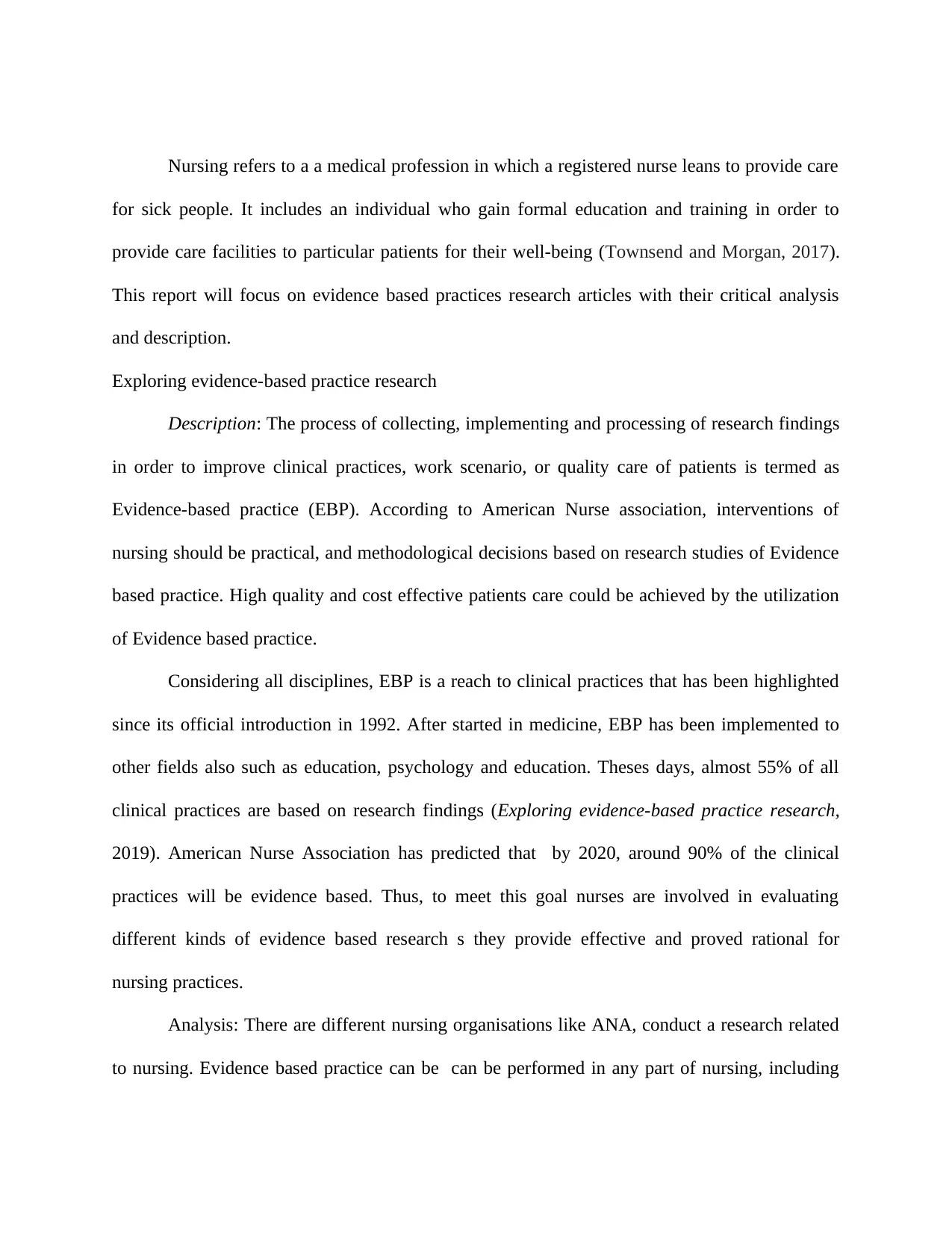
Nursing refers to a a medical profession in which a registered nurse leans to provide care
for sick people. It includes an individual who gain formal education and training in order to
provide care facilities to particular patients for their well-being (Townsend and Morgan, 2017).
This report will focus on evidence based practices research articles with their critical analysis
and description.
Exploring evidence-based practice research
Description: The process of collecting, implementing and processing of research findings
in order to improve clinical practices, work scenario, or quality care of patients is termed as
Evidence-based practice (EBP). According to American Nurse association, interventions of
nursing should be practical, and methodological decisions based on research studies of Evidence
based practice. High quality and cost effective patients care could be achieved by the utilization
of Evidence based practice.
Considering all disciplines, EBP is a reach to clinical practices that has been highlighted
since its official introduction in 1992. After started in medicine, EBP has been implemented to
other fields also such as education, psychology and education. Theses days, almost 55% of all
clinical practices are based on research findings (Exploring evidence-based practice research,
2019). American Nurse Association has predicted that by 2020, around 90% of the clinical
practices will be evidence based. Thus, to meet this goal nurses are involved in evaluating
different kinds of evidence based research s they provide effective and proved rational for
nursing practices.
Analysis: There are different nursing organisations like ANA, conduct a research related
to nursing. Evidence based practice can be can be performed in any part of nursing, including
for sick people. It includes an individual who gain formal education and training in order to
provide care facilities to particular patients for their well-being (Townsend and Morgan, 2017).
This report will focus on evidence based practices research articles with their critical analysis
and description.
Exploring evidence-based practice research
Description: The process of collecting, implementing and processing of research findings
in order to improve clinical practices, work scenario, or quality care of patients is termed as
Evidence-based practice (EBP). According to American Nurse association, interventions of
nursing should be practical, and methodological decisions based on research studies of Evidence
based practice. High quality and cost effective patients care could be achieved by the utilization
of Evidence based practice.
Considering all disciplines, EBP is a reach to clinical practices that has been highlighted
since its official introduction in 1992. After started in medicine, EBP has been implemented to
other fields also such as education, psychology and education. Theses days, almost 55% of all
clinical practices are based on research findings (Exploring evidence-based practice research,
2019). American Nurse Association has predicted that by 2020, around 90% of the clinical
practices will be evidence based. Thus, to meet this goal nurses are involved in evaluating
different kinds of evidence based research s they provide effective and proved rational for
nursing practices.
Analysis: There are different nursing organisations like ANA, conduct a research related
to nursing. Evidence based practice can be can be performed in any part of nursing, including
Paraphrase This Document
Need a fresh take? Get an instant paraphrase of this document with our AI Paraphraser
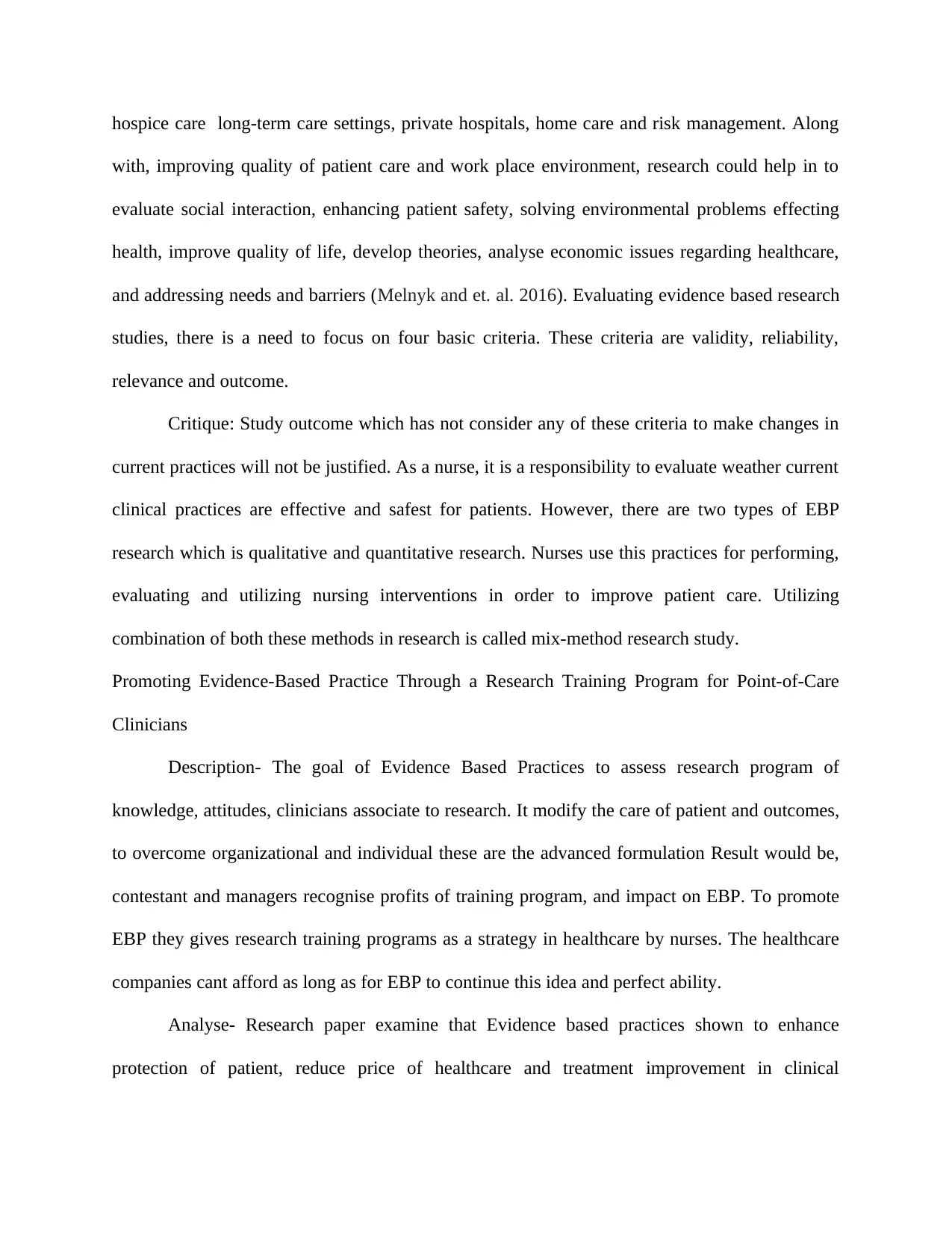
hospice care long-term care settings, private hospitals, home care and risk management. Along
with, improving quality of patient care and work place environment, research could help in to
evaluate social interaction, enhancing patient safety, solving environmental problems effecting
health, improve quality of life, develop theories, analyse economic issues regarding healthcare,
and addressing needs and barriers (Melnyk and et. al. 2016). Evaluating evidence based research
studies, there is a need to focus on four basic criteria. These criteria are validity, reliability,
relevance and outcome.
Critique: Study outcome which has not consider any of these criteria to make changes in
current practices will not be justified. As a nurse, it is a responsibility to evaluate weather current
clinical practices are effective and safest for patients. However, there are two types of EBP
research which is qualitative and quantitative research. Nurses use this practices for performing,
evaluating and utilizing nursing interventions in order to improve patient care. Utilizing
combination of both these methods in research is called mix-method research study.
Promoting Evidence-Based Practice Through a Research Training Program for Point-of-Care
Clinicians
Description- The goal of Evidence Based Practices to assess research program of
knowledge, attitudes, clinicians associate to research. It modify the care of patient and outcomes,
to overcome organizational and individual these are the advanced formulation Result would be,
contestant and managers recognise profits of training program, and impact on EBP. To promote
EBP they gives research training programs as a strategy in healthcare by nurses. The healthcare
companies cant afford as long as for EBP to continue this idea and perfect ability.
Analyse- Research paper examine that Evidence based practices shown to enhance
protection of patient, reduce price of healthcare and treatment improvement in clinical
with, improving quality of patient care and work place environment, research could help in to
evaluate social interaction, enhancing patient safety, solving environmental problems effecting
health, improve quality of life, develop theories, analyse economic issues regarding healthcare,
and addressing needs and barriers (Melnyk and et. al. 2016). Evaluating evidence based research
studies, there is a need to focus on four basic criteria. These criteria are validity, reliability,
relevance and outcome.
Critique: Study outcome which has not consider any of these criteria to make changes in
current practices will not be justified. As a nurse, it is a responsibility to evaluate weather current
clinical practices are effective and safest for patients. However, there are two types of EBP
research which is qualitative and quantitative research. Nurses use this practices for performing,
evaluating and utilizing nursing interventions in order to improve patient care. Utilizing
combination of both these methods in research is called mix-method research study.
Promoting Evidence-Based Practice Through a Research Training Program for Point-of-Care
Clinicians
Description- The goal of Evidence Based Practices to assess research program of
knowledge, attitudes, clinicians associate to research. It modify the care of patient and outcomes,
to overcome organizational and individual these are the advanced formulation Result would be,
contestant and managers recognise profits of training program, and impact on EBP. To promote
EBP they gives research training programs as a strategy in healthcare by nurses. The healthcare
companies cant afford as long as for EBP to continue this idea and perfect ability.
Analyse- Research paper examine that Evidence based practices shown to enhance
protection of patient, reduce price of healthcare and treatment improvement in clinical
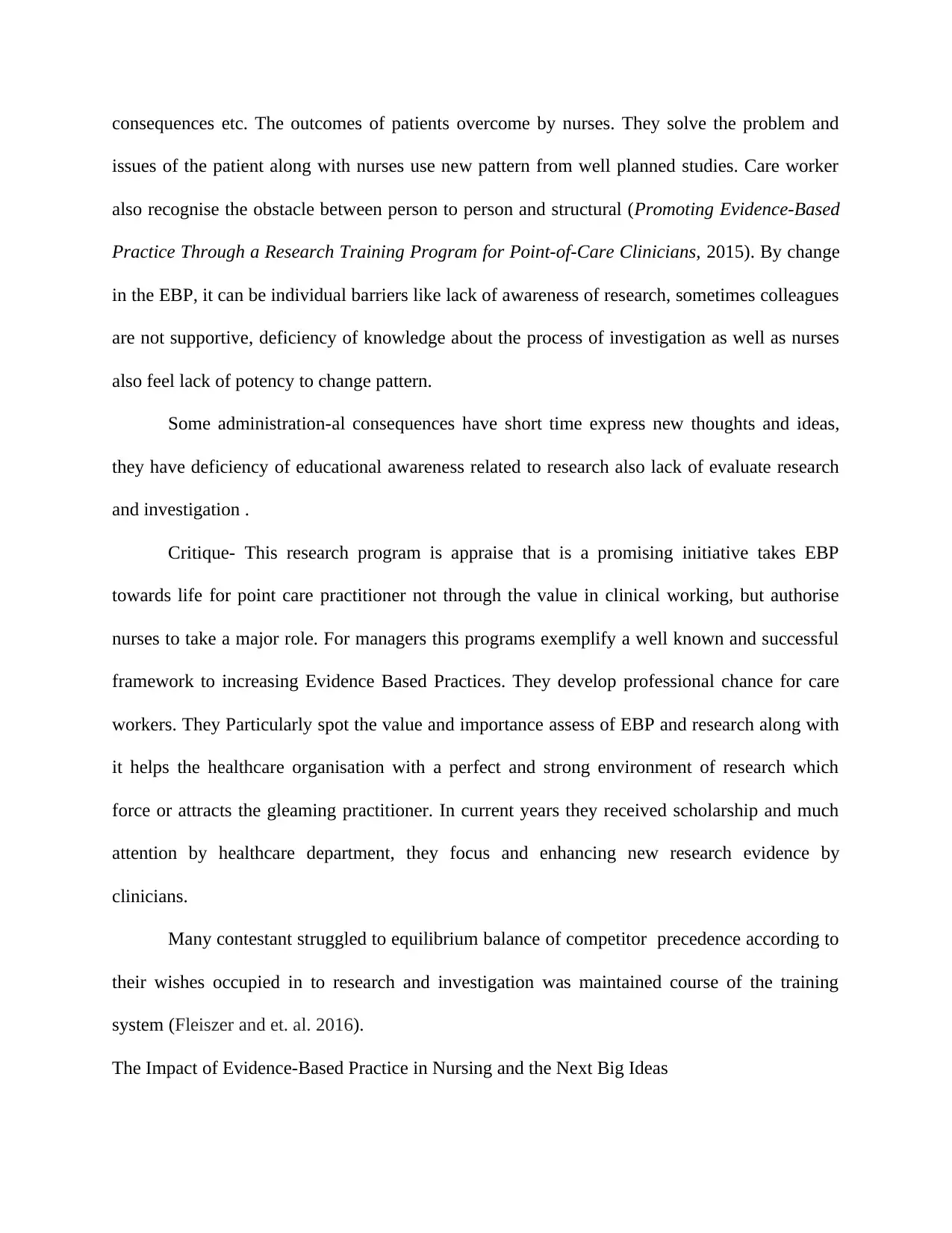
consequences etc. The outcomes of patients overcome by nurses. They solve the problem and
issues of the patient along with nurses use new pattern from well planned studies. Care worker
also recognise the obstacle between person to person and structural (Promoting Evidence-Based
Practice Through a Research Training Program for Point-of-Care Clinicians, 2015). By change
in the EBP, it can be individual barriers like lack of awareness of research, sometimes colleagues
are not supportive, deficiency of knowledge about the process of investigation as well as nurses
also feel lack of potency to change pattern.
Some administration-al consequences have short time express new thoughts and ideas,
they have deficiency of educational awareness related to research also lack of evaluate research
and investigation .
Critique- This research program is appraise that is a promising initiative takes EBP
towards life for point care practitioner not through the value in clinical working, but authorise
nurses to take a major role. For managers this programs exemplify a well known and successful
framework to increasing Evidence Based Practices. They develop professional chance for care
workers. They Particularly spot the value and importance assess of EBP and research along with
it helps the healthcare organisation with a perfect and strong environment of research which
force or attracts the gleaming practitioner. In current years they received scholarship and much
attention by healthcare department, they focus and enhancing new research evidence by
clinicians.
Many contestant struggled to equilibrium balance of competitor precedence according to
their wishes occupied in to research and investigation was maintained course of the training
system (Fleiszer and et. al. 2016).
The Impact of Evidence-Based Practice in Nursing and the Next Big Ideas
issues of the patient along with nurses use new pattern from well planned studies. Care worker
also recognise the obstacle between person to person and structural (Promoting Evidence-Based
Practice Through a Research Training Program for Point-of-Care Clinicians, 2015). By change
in the EBP, it can be individual barriers like lack of awareness of research, sometimes colleagues
are not supportive, deficiency of knowledge about the process of investigation as well as nurses
also feel lack of potency to change pattern.
Some administration-al consequences have short time express new thoughts and ideas,
they have deficiency of educational awareness related to research also lack of evaluate research
and investigation .
Critique- This research program is appraise that is a promising initiative takes EBP
towards life for point care practitioner not through the value in clinical working, but authorise
nurses to take a major role. For managers this programs exemplify a well known and successful
framework to increasing Evidence Based Practices. They develop professional chance for care
workers. They Particularly spot the value and importance assess of EBP and research along with
it helps the healthcare organisation with a perfect and strong environment of research which
force or attracts the gleaming practitioner. In current years they received scholarship and much
attention by healthcare department, they focus and enhancing new research evidence by
clinicians.
Many contestant struggled to equilibrium balance of competitor precedence according to
their wishes occupied in to research and investigation was maintained course of the training
system (Fleiszer and et. al. 2016).
The Impact of Evidence-Based Practice in Nursing and the Next Big Ideas
⊘ This is a preview!⊘
Do you want full access?
Subscribe today to unlock all pages.

Trusted by 1+ million students worldwide
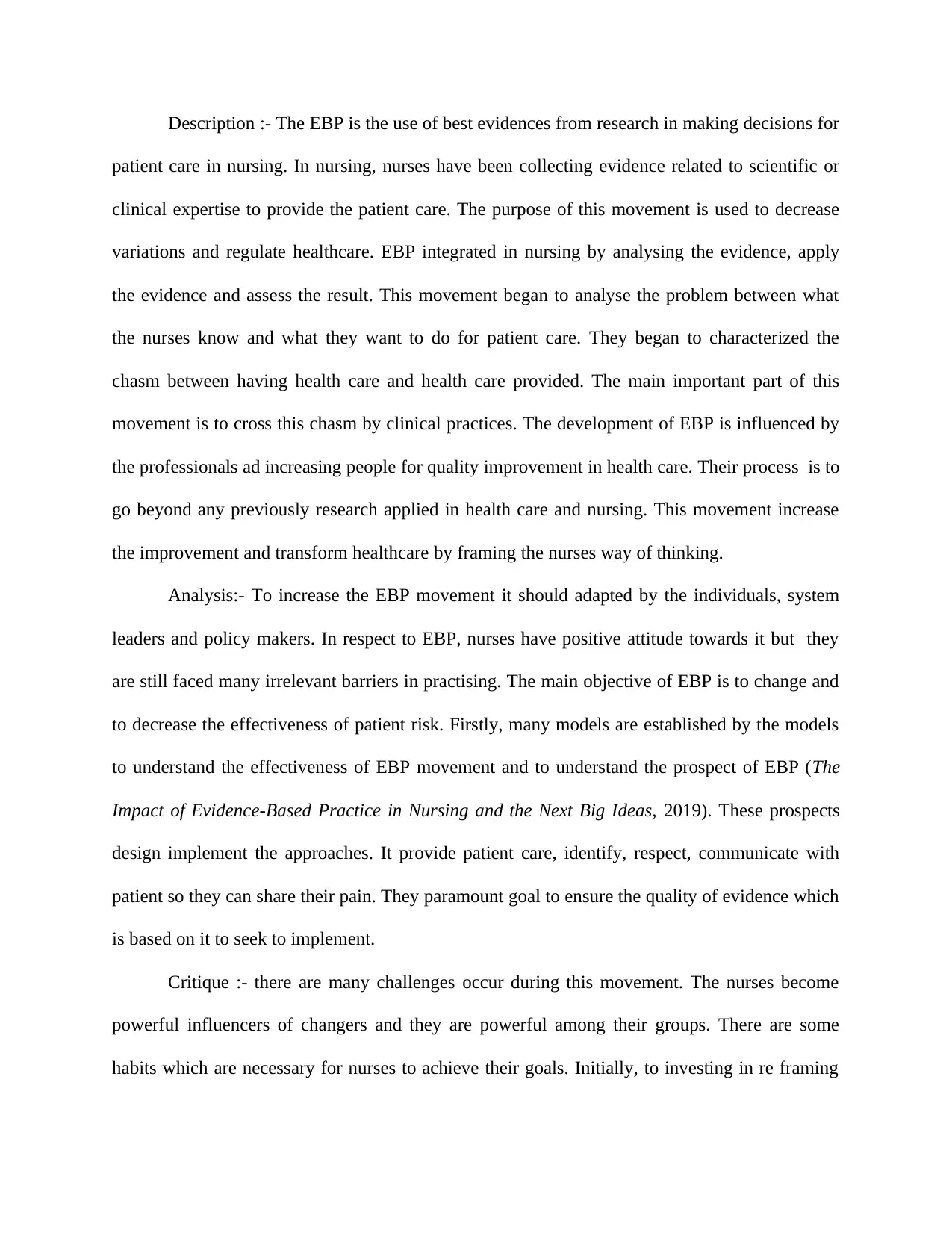
Description :- The EBP is the use of best evidences from research in making decisions for
patient care in nursing. In nursing, nurses have been collecting evidence related to scientific or
clinical expertise to provide the patient care. The purpose of this movement is used to decrease
variations and regulate healthcare. EBP integrated in nursing by analysing the evidence, apply
the evidence and assess the result. This movement began to analyse the problem between what
the nurses know and what they want to do for patient care. They began to characterized the
chasm between having health care and health care provided. The main important part of this
movement is to cross this chasm by clinical practices. The development of EBP is influenced by
the professionals ad increasing people for quality improvement in health care. Their process is to
go beyond any previously research applied in health care and nursing. This movement increase
the improvement and transform healthcare by framing the nurses way of thinking.
Analysis:- To increase the EBP movement it should adapted by the individuals, system
leaders and policy makers. In respect to EBP, nurses have positive attitude towards it but they
are still faced many irrelevant barriers in practising. The main objective of EBP is to change and
to decrease the effectiveness of patient risk. Firstly, many models are established by the models
to understand the effectiveness of EBP movement and to understand the prospect of EBP (The
Impact of Evidence-Based Practice in Nursing and the Next Big Ideas, 2019). These prospects
design implement the approaches. It provide patient care, identify, respect, communicate with
patient so they can share their pain. They paramount goal to ensure the quality of evidence which
is based on it to seek to implement.
Critique :- there are many challenges occur during this movement. The nurses become
powerful influencers of changers and they are powerful among their groups. There are some
habits which are necessary for nurses to achieve their goals. Initially, to investing in re framing
patient care in nursing. In nursing, nurses have been collecting evidence related to scientific or
clinical expertise to provide the patient care. The purpose of this movement is used to decrease
variations and regulate healthcare. EBP integrated in nursing by analysing the evidence, apply
the evidence and assess the result. This movement began to analyse the problem between what
the nurses know and what they want to do for patient care. They began to characterized the
chasm between having health care and health care provided. The main important part of this
movement is to cross this chasm by clinical practices. The development of EBP is influenced by
the professionals ad increasing people for quality improvement in health care. Their process is to
go beyond any previously research applied in health care and nursing. This movement increase
the improvement and transform healthcare by framing the nurses way of thinking.
Analysis:- To increase the EBP movement it should adapted by the individuals, system
leaders and policy makers. In respect to EBP, nurses have positive attitude towards it but they
are still faced many irrelevant barriers in practising. The main objective of EBP is to change and
to decrease the effectiveness of patient risk. Firstly, many models are established by the models
to understand the effectiveness of EBP movement and to understand the prospect of EBP (The
Impact of Evidence-Based Practice in Nursing and the Next Big Ideas, 2019). These prospects
design implement the approaches. It provide patient care, identify, respect, communicate with
patient so they can share their pain. They paramount goal to ensure the quality of evidence which
is based on it to seek to implement.
Critique :- there are many challenges occur during this movement. The nurses become
powerful influencers of changers and they are powerful among their groups. There are some
habits which are necessary for nurses to achieve their goals. Initially, to investing in re framing
Paraphrase This Document
Need a fresh take? Get an instant paraphrase of this document with our AI Paraphraser
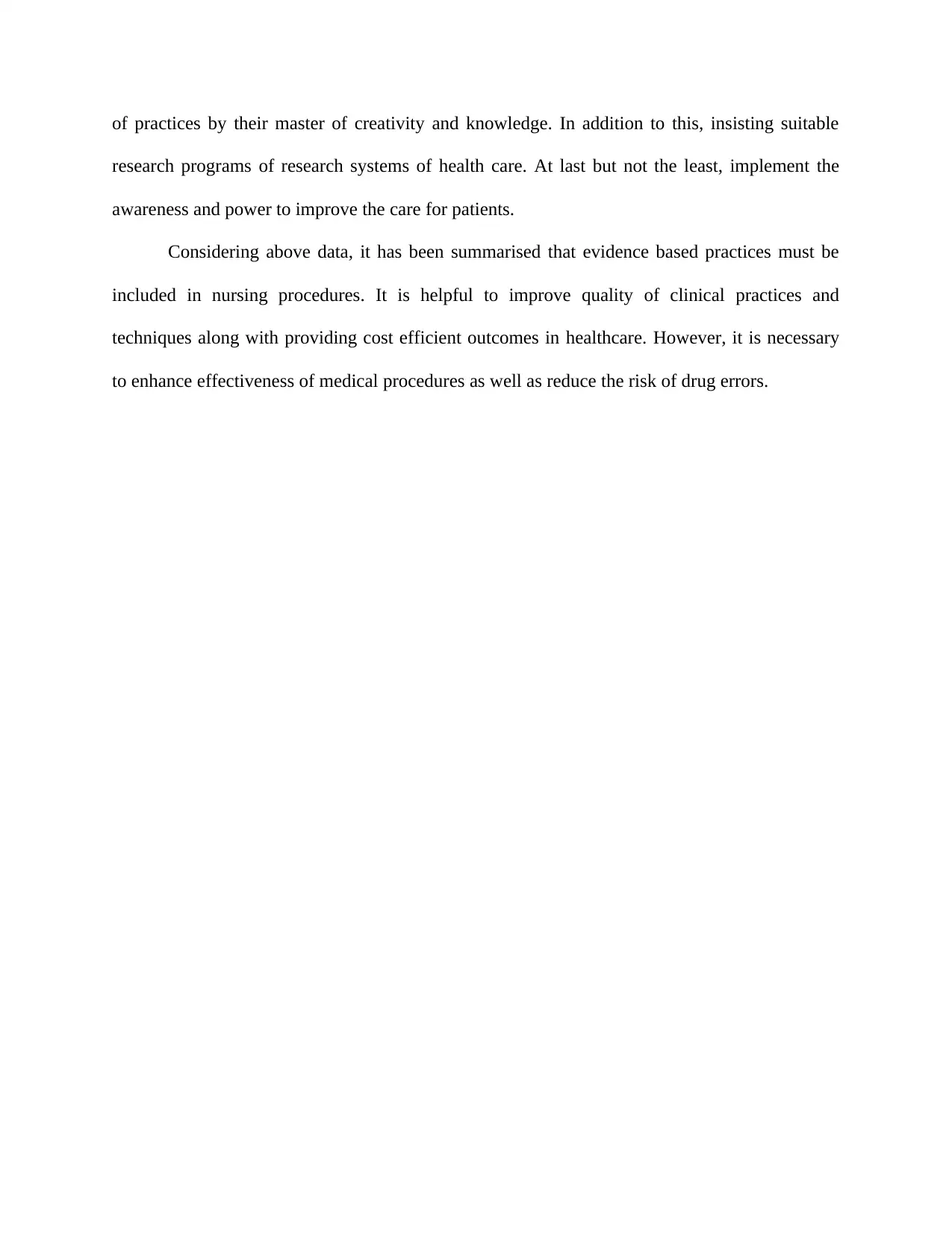
of practices by their master of creativity and knowledge. In addition to this, insisting suitable
research programs of research systems of health care. At last but not the least, implement the
awareness and power to improve the care for patients.
Considering above data, it has been summarised that evidence based practices must be
included in nursing procedures. It is helpful to improve quality of clinical practices and
techniques along with providing cost efficient outcomes in healthcare. However, it is necessary
to enhance effectiveness of medical procedures as well as reduce the risk of drug errors.
research programs of research systems of health care. At last but not the least, implement the
awareness and power to improve the care for patients.
Considering above data, it has been summarised that evidence based practices must be
included in nursing procedures. It is helpful to improve quality of clinical practices and
techniques along with providing cost efficient outcomes in healthcare. However, it is necessary
to enhance effectiveness of medical procedures as well as reduce the risk of drug errors.
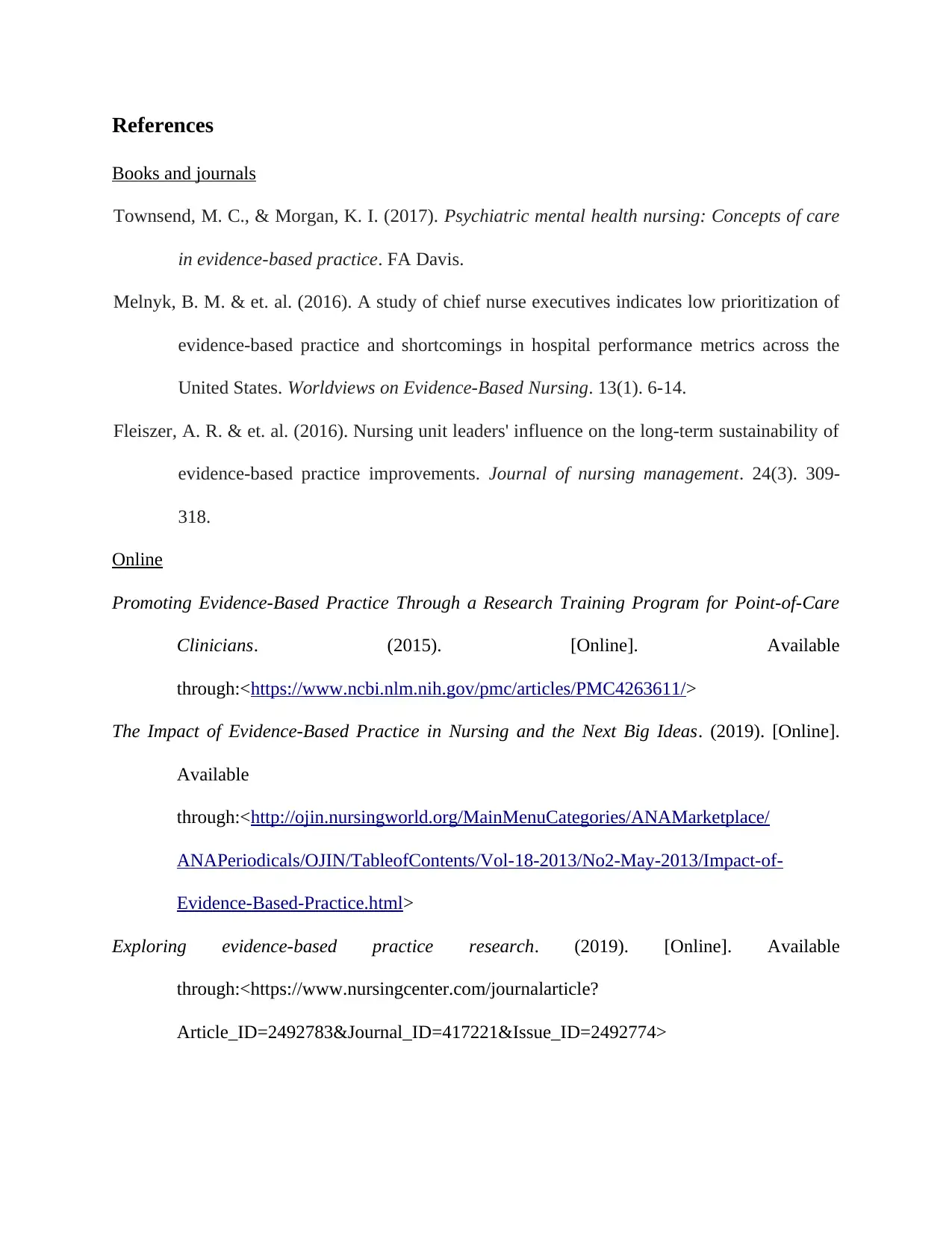
References
Books and journals
Townsend, M. C., & Morgan, K. I. (2017). Psychiatric mental health nursing: Concepts of care
in evidence-based practice. FA Davis.
Melnyk, B. M. & et. al. (2016). A study of chief nurse executives indicates low prioritization of
evidence‐based practice and shortcomings in hospital performance metrics across the
United States. Worldviews on Evidence‐Based Nursing. 13(1). 6-14.
Fleiszer, A. R. & et. al. (2016). Nursing unit leaders' influence on the long‐term sustainability of
evidence‐based practice improvements. Journal of nursing management. 24(3). 309-
318.
Online
Promoting Evidence-Based Practice Through a Research Training Program for Point-of-Care
Clinicians. (2015). [Online]. Available
through:<https://www.ncbi.nlm.nih.gov/pmc/articles/PMC4263611/>
The Impact of Evidence-Based Practice in Nursing and the Next Big Ideas. (2019). [Online].
Available
through:<http://ojin.nursingworld.org/MainMenuCategories/ANAMarketplace/
ANAPeriodicals/OJIN/TableofContents/Vol-18-2013/No2-May-2013/Impact-of-
Evidence-Based-Practice.html>
Exploring evidence-based practice research. (2019). [Online]. Available
through:<https://www.nursingcenter.com/journalarticle?
Article_ID=2492783&Journal_ID=417221&Issue_ID=2492774>
Books and journals
Townsend, M. C., & Morgan, K. I. (2017). Psychiatric mental health nursing: Concepts of care
in evidence-based practice. FA Davis.
Melnyk, B. M. & et. al. (2016). A study of chief nurse executives indicates low prioritization of
evidence‐based practice and shortcomings in hospital performance metrics across the
United States. Worldviews on Evidence‐Based Nursing. 13(1). 6-14.
Fleiszer, A. R. & et. al. (2016). Nursing unit leaders' influence on the long‐term sustainability of
evidence‐based practice improvements. Journal of nursing management. 24(3). 309-
318.
Online
Promoting Evidence-Based Practice Through a Research Training Program for Point-of-Care
Clinicians. (2015). [Online]. Available
through:<https://www.ncbi.nlm.nih.gov/pmc/articles/PMC4263611/>
The Impact of Evidence-Based Practice in Nursing and the Next Big Ideas. (2019). [Online].
Available
through:<http://ojin.nursingworld.org/MainMenuCategories/ANAMarketplace/
ANAPeriodicals/OJIN/TableofContents/Vol-18-2013/No2-May-2013/Impact-of-
Evidence-Based-Practice.html>
Exploring evidence-based practice research. (2019). [Online]. Available
through:<https://www.nursingcenter.com/journalarticle?
Article_ID=2492783&Journal_ID=417221&Issue_ID=2492774>
⊘ This is a preview!⊘
Do you want full access?
Subscribe today to unlock all pages.

Trusted by 1+ million students worldwide
1 out of 6
Related Documents
Your All-in-One AI-Powered Toolkit for Academic Success.
+13062052269
info@desklib.com
Available 24*7 on WhatsApp / Email
![[object Object]](/_next/static/media/star-bottom.7253800d.svg)
Unlock your academic potential
Copyright © 2020–2026 A2Z Services. All Rights Reserved. Developed and managed by ZUCOL.





